- Home
- Georgette Heyer
Black Sheep Page 16
Black Sheep Read online
Page 16
'Laura Butterbank!' said Abby, in a failing voice. 'Odious, infamous creature that you are!'
'Oh, I can be far more odious than that!' he told her. 'And if I have any more wit and liveliness from you, Miss Abigail Wendover, I'll give you proof of it!'
'Quite unnecessary!' she assured him. 'I haven't the least doubt of it!'
She could not see his face in the darkness of the carriage, but she knew that he was smiling. He said, however, in stern accents: 'Will you go with me to Wells, ma'am, or will you not?'
'Yes, sir,' said Abby meekly. 'If you are quite sure you wouldn't prefer Miss Butterbank's company to mine!'
The carriage had drawn up in front of her house. Mr Calverleigh, alighting from it, and turning to hand her down, said: 'I should, of course, but having already invited you I feel it would be uncivil to fob you off.'
'Piqued, repiqued, and capoted!' said Abby, acknowledging defeat.
Ten
The visit to the theatre produced its inevitable repercussions. Only such severe critics as Mrs Ruscombe saw anything to shock them in it, but it was surprising how quickly the word sped round Bath that Mr Miles Calverleigh was becoming extremely particular in his attentions to Miss Abigail Wendover. There was nothing in this to give rise to speculation, for Abby had never lacked admirers; but considerable interest was lent to the affair by what was generally considered to be her encouragement of the gentleman's pretensions.
'Only think of her going to the play with him all by herself ! When Lady Templeton told me of it I could only stare at her! I'm sure she has never done such a thing before!' said Mrs Ancrum.
'Mark my words,' said Lady Weaverham, 'it's a Case! Well, I'm sure I wish them both very happy!'
'Quite a new come-out!' said Mrs Ruscombe, with her thin smile. 'It doesn't astonish me: I have always thought her a trifle bold.'
Abby was well aware that she had become overnight an object for curiosity; and so, within a couple of days, was Selina, who was thrown into what she called a taking by the arch efforts of one of her acquaintances to discover whether dear Miss Abigail was about to contract an engagement.
'I was never so much provoked in my life!' she declared. 'Such impertinence! I gave her a sharp set-down, as you may suppose! You and Mr Calverleigh – ! If I hadn't been vexed to death, I could have laughed in her face! Why, he isn't even well-favoured, besides being quite beneath your touch – not, of course, by birth, but a man of most unsavoury reputation, though that Mrs Swainswick knows nothing about, and you may depend upon it I didn't breathe a syllable to her. But how she could have the impudence to imagine – not but what I knew how it would be from the start, and I must beg you, dear Abby, to keep him at a proper distance!'
Abby was quite as much vexed as Selina, but her indignation took a different form. 'What a piece of work about nothing!' she said contemptuously. 'I should rather think you would give that vulgar busy head a sharp set-down! What would be quite beneath my touch would be to pay the smallest attention to anything she, or others like her, may choose to say of me!'
If more than the vulgar Mrs Swainswick's sly question had been needed to rouse the spirit of rebellion slumbering in her breast, it was provided by Mr Peter Dunston, who told her that he was afraid his mother had been quite shocked by the news of her escapade. 'She is old-fashioned, you know. I need hardly assure you that I do not share her sentiments! What you do could never be wrong, Miss Abigail. Indeed, if I had as little regard for your good name in Bath as Calverleigh I should have ventured to invite you to go to the play in my company!'
This put Abby in such a flame that if Mr Calverleigh had asked her to jaunter off to Wells with only himself as escort she would instantly have agreed to it. Not being informed of her state of mind, he did not do so; but as the two younger members of his party soon wandered off together, when they reached Wells, he did, in fact, become her only escort for a large part of the day, the only flaw to this agreeable arrangement being that none of the Bath quidnuncs knew anything about it. But this regret was soon forgotten in the pleasure of introducing, to a Cathedral she loved, one who was quick to appreciate its beauty, needing no prompting from her. She thought, in touching innocence, that in Miles Calverleigh she had found a friend, and a better one by far than any other, because his mind moved swiftly, because he could make her laugh even when she was out of charity with him, and because of a dozen other attributes which were quite frivolous – hardly attributes at all, in fact – but which added up to a charming total, outweighing the more important faults in his character. She was aware of these, but she could find excuses for his cynicism, and even for the coldness of heart which made him look upon the problems or the troubles besetting other people with a detachment so profound as to seem inhuman. It was no wonder that twenty years of exile had made him uncaring: the wonder was that he was not embittered. As for the life he had led during those years, she did not suppose that virtue had played a noticeable part in it, but she felt it to be no concern of hers. Nor did she wish to know how many mistresses he had had, or what excesses he might have committed: the past might keep its secrets, leaving her to the enjoyment of the present.
If she spared a thought for her niece, whom she had so reprehensibly allowed to escape from her chaperonage, it was merely to hope that Fanny was enjoying the day as much as she was. The child had not been in spirits at the start of the expedition. She had tried to hide it with rather more than her usual vivacity, but her gaiety had had a brittle quality. Abby dared not hope that she had quarrelled with Stacy; probably she was downcast because she had begun to despair of winning her family's consent to her projected engagement. Perhaps Oliver would succeed in coaxing her out of the dumps; perhaps, if Lavinia, who had not yet learnt to withhold confidences from those she loved, had told him the story of Fanny's infatuation, he might even venture to offer her a little advice. Abby had no doubt that it would be good advice, and very little that advice from a man with whom Fanny stood on friendly terms would be listened to far more readily than advice from an aunt.
Oliver did know the story, but the only advice he gave was addressed to his sister. He had listened to her sentimental out pourings in silence, disappointing her by saying quietly, when she had done: 'Lavvy, you shouldn't repeat what Fanny tells you.'
'Oh, no! Only to you – and Mama, of course!'
'Well, to Mama, perhaps, but not to me. I let you do so only because I already knew, from Mama, that Fanny had formed an – an attachment which her aunt dislikes. And because I fancy you are much in sympathy with her.'
'Yes, indeed I am!' she said earnestly. 'It is the most affecting thing imaginable, for they fell in love the first time they met! He is so handsome, too, and has such an air! And merely because he hasn't the advantage of fortune – as though it signified, when Fanny is positively rolling in riches! –'
'It isn't that,' he interrupted, hesitating a little. 'Not wholly that.'
'Oh, you are thinking that he was used to be very wild, and expensive, but –'
'No, I'm not, Lavvy. I know nothing about him, except that –' Again he hesitated; and then, as she directed a look of puzzled enquiry at him, said, with a little difficulty: 'He isn't a halfling, you know, or a greenhorn. He must be a dozen years older than Fanny, and a man of the world into the bargain.'
'Yes!' said Lavinia enthusiastically. 'Anyone can see he is of the first stare, which makes it so particularly romantic that he should have fallen in love with Fanny! I don't mean to say that she isn't ravishingly pretty, because she is, but I should think there must be scores of fashionable London-girls on the catch for him, wouldn't you?'
'Listen, Lavvy!' he said. 'The thing is that he hasn't behaved as he ought! A man of honour don't flummery a girl into meeting him upon the sly, and, he don't pop the question to her without asking leave of her guardian!'
'Oh, Oliver, you are repeating what Mama says! How can you be so stuffy? Next you will be saying that Fanny ought to wait meekly until her guardian bestows her on a
man of his choice!'
'I shan't say anything of the sort. But I'll tell you this, Lavvy: if Calverleigh had made you the object of his havey-cavey attentions I'd knock his teeth down his throat!'
Startled, and rather impressed, she said: 'Good gracious! Would you? Well!'
'Try to, at all events,' he said, laughing. 'It's what any man would do.'
She did not look to be entirely convinced. He put his arm round her, and gave her a brotherly hug. 'It isn't for me to interfere: I haven't the right. But you'll be a poor friend to Fanny if you don't make a push to persuade her not to throw her cap over the windmill. That's the way to return by Weeping Cross.'
He had said no more, and how much of what he had said was repeated to Fanny he had no means of knowing, because he was wary of betraying to his sister that he took far more than a neutral interest in the affair, and so would not ask her. Between himself and Fanny it was never discussed, and much as he longed to beg her not to throw herself away on a court-card who, in his view, was an ugly customer if ever he saw one, it did not come within his province to meddle in the affairs of a girl who would never be more to him than an unattainable dream, or within his code of honour to cry rope upon a fellow behind his back. Given the flimsiest of excuses – if only he had been even remotely related to Fanny! – he would speedily have cut the fellow's comb for him; for although he was not yet in high force he had no doubt of his ability to draw the elegant Mr Stacy Calverleigh's cork, besides darkening both his daylights, before tipping him a settler. His hands clenched themselves instinctively into two bunches of purposeful fives as he allowed his fancy to dwell for a moment on the pleasing vision of a regular set-to with Stacy. He was innately chivalrous, but he would have no compunction whatsoever in milling down this sneaking rascal, who, if he had ever come to handy-blows in his life (which Mr Grayshott doubted) was certainly no match for one whose science, and punishing left, had won fame for him in the annals of his school and college. But only for a moment did the vision endure: even the excuse of rivalry was denied him. Mr Grayshott, setting out for India in high hope, and eager determination to prove himself worthy of his uncle's trust, had been defeated by his constitution, and saw himself as a failure. Mr Balking had told him not to tease himself about the future, and not to take it so much to heart that his health had broken down. 'For how could you help it? I wish I'd never sent you to Calcutta – except that the experience you've gained will stand you in good stead. I've a place for you in the London house, but time enough to talk of that when you're on your pins again.'
Mr Balking had been kindness itself, but Oliver, his spirits as much as his gaunt frame worn down by recurrent fever, foresaw that he was destined to become a clerk in the countinghouse, from which lowly position he was unlikely to rise for many dreary years. He had set no store by Uncle Leonard's assurances that he was very well satisfied with his work in Calcutta: that was the sort of thing that an affectionate uncle might be expected to say. He had reached Bath in a state of deep depression, but as his health improved so did his spirits, and he began to think that it might not be so very long before he worked his way up to a position of trust. When he was able to look back dispassionately over the two years he had spent in India, he thought that perhaps his uncle really was satisfied with his progress there. He had found his work of absorbing interest, and knew that he had a talent for business. In fact, if he had been a windy-wallets, boasting of his every small success, he would have said that he had done pretty well in the Calcutta house. As he was a diffident, and rather reticent young man, he maintained a strict silence on the subject, and waited, in gradually increasing hopefulness, for the day when his doctor should pronounce him well enough to apply himself once more to business.
But his optimism did not lead him to the length of supposing that the Wendovers would ever consider him to be an eligible husband for Fanny. Older than his years, he recognised in Fanny's passionate attachment to Stacy a schoolgirl's brief, violent infatuation. He was reminded of the throes into which Lavinia, at the age of fifteen, had been cast when she fell sud denly, and inexplicably, in love with one of the visiting professors at Miss Timble's Seminary. It had made her remarkably tiresome for several weeks, but there had been no harm in it, her passion being unrequited, and the professor a respectable man, with a wife, and five children, to all of whom he was devoted. Neither Oliver nor Mrs Grayshott had set any store by the event; Oliver thought that he would have set as little by Fanny's present bewitchment had she but lost her foolish heart to a man of character. As it was, he was pretty sure that she had walked into a snare set for her by a handsome fortune-hunter, and he was extremely uneasy. Something Lavinia had let slip from her tongue, and hastily retracted, had given rise in his mind to the incredible suspicion that a runaway marriage was in contem plation. He found that his mother shared this suspicion, and was only partly reassured when he learned that she had warned Miss Abigail Wendover of a possible danger. Miss Abigail was no fool, but he felt that the situation demanded a man's hand. Failing her brother, who did not seem to be one on whom Miss Abigail placed any reliance, the obvious man to intervene was Mr Miles Calverleigh. But Miles showed no disposition to do so, or even to take any interest in his nephew's activities. That did not sur prise Oliver: he had not spent several weeks in Mr Calverleigh's company without discovering that he never did take any interest in persons he didn't like. It was inconceivable that a man of his cut could like Stacy, and useless to suppose that regard for the good name of his family would impel him to exert himself to preserve it: he had no such regard. On the other hand, there could be no doubt that he liked Miss Abigail Wendover very much indeed. Oliver, naturally precluded from discussing Stacy with Stacy's uncle, could only hope that his tendre for her would move him to come to her assistance. He was a strange man, so cold, and yet so kind; there was no understanding him, but one thing was sure: if he did befriend one, there were no limits to the help he would, in his unconcerned way, extend. It was possible, of course, that Miss Abigail, like himself, would feel all the awkwardness of broaching the matter to him. Oliver thought that perhaps his mother might prevail upon her to overcome such scruples, and decided to nudge her into making the attempt.
During the drive to Wells he realised, as quickly as her aunt, that Fanny was doing her best to hide some inward care under a mask of gaiety. His heart went out to her, the sweet, silly baby that she was. He felt almost sick with the longing to gather her into his arms; but that desire must be repressed: not only did his circumstances make it impossible for him to declare himself, but Fanny did not want his love, but only his friendship. She had said once, when his mother had reproved him for calling her by her name: 'Oh, but I begged him to do so, ma'am! Because Lavvy and I have always been like sisters, so Oliver must be my brother!'
Half a loaf was better than no bread: he didn't know who had been responsible for that silly proverb, only that he must have been a cod's head. It wasn't better; when the lovely, darling girl you would have given your soul to possess invited you to be her brother it was infinitely worse.
But if a brother was what Fanny wanted, a brother she should have; and perhaps, adopting that distasteful rôle, he might, at least, be admitted into her confidence, and be granted the opportunity to offer her wiser counsel than she would get from his foolish sister.
So when they had stayed for some time in the chapel in the north aisle of the Cathedral, where the famous clock had been placed, and had watched the little knights endlessly tilting at each other across the barrier which surmounted it, he detained Fanny, as she was preparing to follow her aunt and Mr Calverleigh to another part of the Cathedral, and suggested that they might go and sit down outside for a while. She agreed readily to this, causing his heart to melt by looking up at him in quick anxiety, and saying: 'Yes, to be sure we'll do that, if you wouldn't liefer go back to the Swan? There's nothing so fatiguing as Cathedrals! You are tired already, aren't you?'
'No, I promise you I'm not – or only a very l
ittle!' he answered. 'I think I might be, however, if I were obliged to go all over this place, because that would mean standing to gaze at tombs, and screens, and windows! I don't know why it should be so, but standing is a thing I can't yet do, though I am beginning to walk with the best of you.'
'Well, you shan't stand. If it is not too chilly for you, we'll go and sit by the moat round the Palace, and watch the swans. And if my aunt should ask you what you think of the figures on the West Front you may say that you've never seen anything so truly exquisite. That wouldn't be a fib, do you think?'
His eyes were full of tender amusement; he said gravely:
'No, just suggestio falsi ! Ought I to see them?'
'Good gracious, no! There are tiers and tiers of them!'
'In that case, I'm ready to tell any number of fibs – even a real bouncer!'
She laughed, and then fell silent for a minute or two. He made no attempt to break into her abstraction, but presently she seemed to recall herself, and embarked on some light, everyday chit-chat, rather in the manner of a hostess trying to entertain a difficult guest. It was plainly an effort, and he stopped her, saying involuntarily: 'Ah, don't, Fanny!'

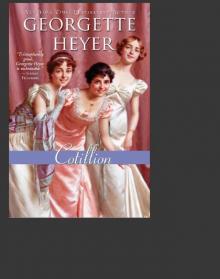 Cotillion
Cotillion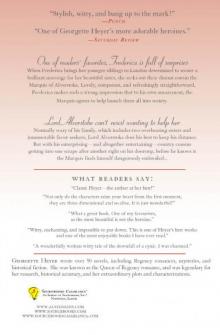 Frederica
Frederica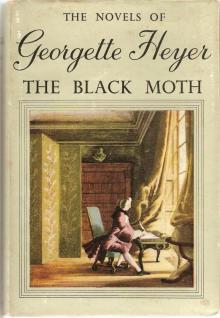 The Black Moth: A Romance of the XVIIIth Century
The Black Moth: A Romance of the XVIIIth Century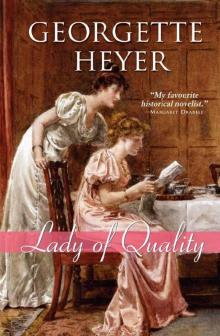 Lady of Quality
Lady of Quality Snowdrift and Other Stories
Snowdrift and Other Stories An Infamous Army
An Infamous Army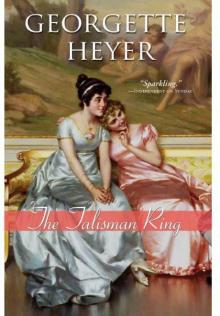 The Talisman Ring
The Talisman Ring Venetia
Venetia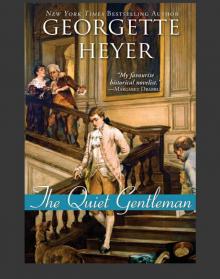 The Quiet Gentleman
The Quiet Gentleman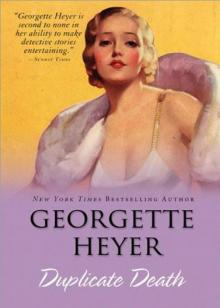 Duplicate Death
Duplicate Death Cousin Kate
Cousin Kate Black Sheep
Black Sheep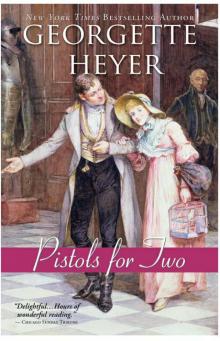 Pistols for Two
Pistols for Two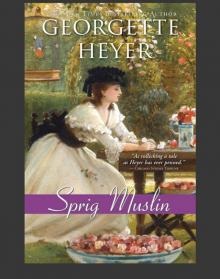 Sprig Muslin
Sprig Muslin No Wind of Blame
No Wind of Blame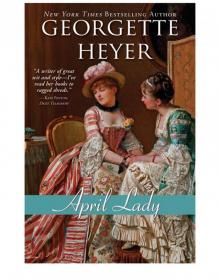 April Lady
April Lady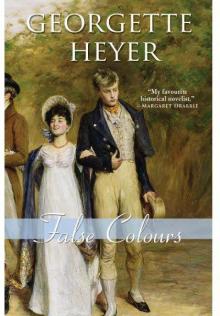 False Colours
False Colours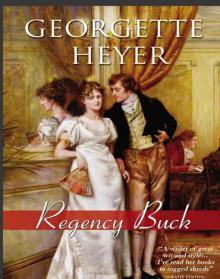 Regency Buck
Regency Buck The Toll-Gate
The Toll-Gate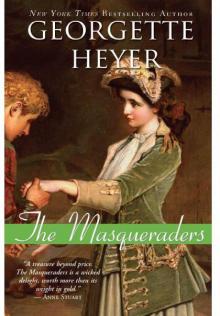 The Masqueraders
The Masqueraders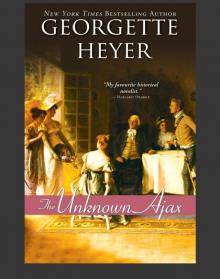 The Unknown Ajax
The Unknown Ajax The Grand Sophy
The Grand Sophy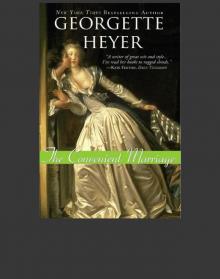 The Convenient Marriage
The Convenient Marriage Faro's Daughter
Faro's Daughter The Conqueror
The Conqueror The Foundling
The Foundling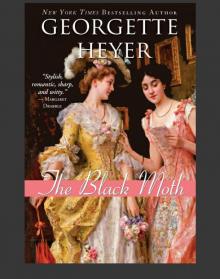 The Black Moth
The Black Moth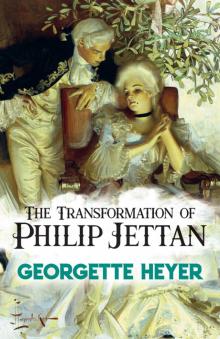 The Transformation of Philip Jettan
The Transformation of Philip Jettan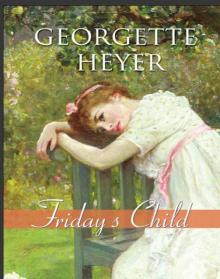 Friday's Child
Friday's Child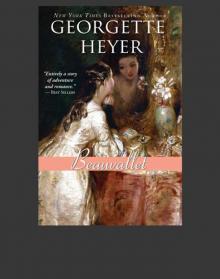 Beauvallet
Beauvallet They Found Him Dead
They Found Him Dead Charity Girl
Charity Girl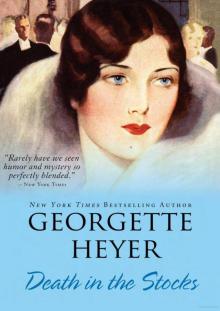 Death in the Stocks: Merely Murder
Death in the Stocks: Merely Murder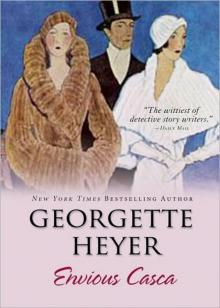 Envious Casca
Envious Casca Behold, Here's Poison
Behold, Here's Poison Arabella
Arabella The Nonesuch
The Nonesuch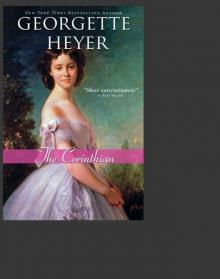 The Corinthian
The Corinthian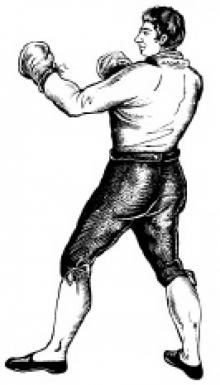 Jennifer Kloester
Jennifer Kloester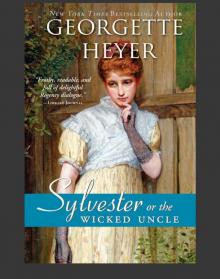 Sylvester
Sylvester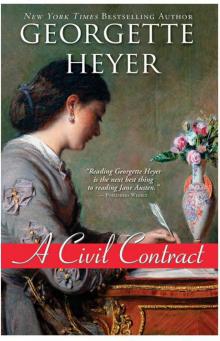 A Civil Contract
A Civil Contract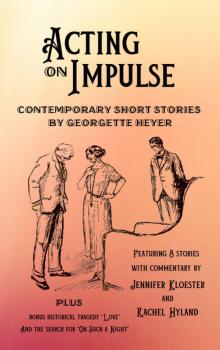 Acting on Impulse
Acting on Impulse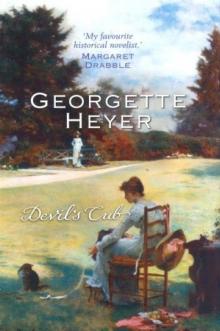 Devil’s Cub at-2
Devil’s Cub at-2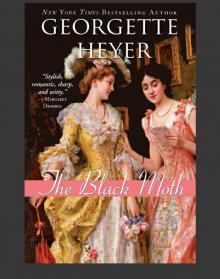 Black Moth
Black Moth Grand Sophy
Grand Sophy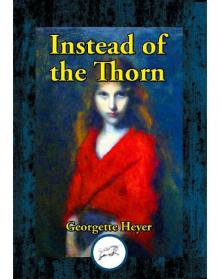 Instead of the Thorn
Instead of the Thorn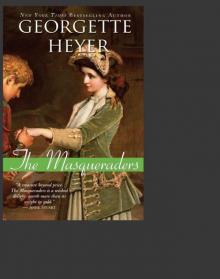 Masqueraders
Masqueraders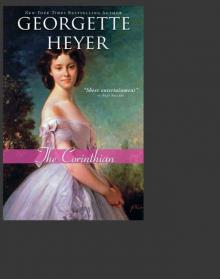 Corinthian
Corinthian Reluctant Widow
Reluctant Widow